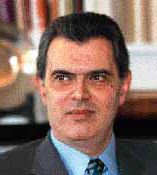Jointly published by the United States Committee for a Free Lebanon and the Middle East Forum
| Vol. 2 No. 2 | February 2000 |
Back to February 2000 Table of Contents
Back to Middle East Intelligence Bulletin homepage.
Lebanon Prepares for Elections . . . Damascus-Style
by Gary C. Gambill
According to a new law approved last month by the Lebanese cabinet and sent to parliament for ratification, all privately-owned television and radio stations will be prohibited from broadcasting news about Lebanon's parliamentary elections this summer. Only the state-run media stations Tele-Liban and Radio Liban will be permitted to cover the political process.
"This bill is an assault on freedoms and equality. It's a clear violation of the Constitution"
Future Television Chairman Nadim Munla
|
Television and radio executives sharply condemned the bill as "a violation of the Constitution and an abuse to audio-visual media rights" in a statement released last month and "categorically rejected any interference in [election] coverage." Although the ostensible purpose of the legislation is to guarantee "fair and equal" coverage of the 700+ candidates expected to compete in the elections, critics charge that allowing government officials to control press coverage of political campaigns will seriously compromise the electoral process. The language of the bill appears deliberately vague--the prohibition of "election media and advertising" could be interpreted as including everything from news analysis to photographs and political cartoons.1 In this respect, it would be among the most sweeping legal restrictions on press coverage of politics anywhere in the Arab world.
The bill stipulates that the government's National Audio-Visual Media Council will monitor the compliance of private media stations to verify that they are not reporting on either the elections or political campaigns. Any station found to have violated the law will be shut down for three days after the first offense and closed for at least a week after the second.
 |
| MP Nassib Lahoud |
Meanwhile, an effort by Beirut MP Najah Wakim to challenge a controversial electoral law that violates the Taif Accord by gerrymandering electoral districts in favor of pro-Syrian candidates failed last month. Ten signatures by members of parliament were needed in order to submit the challenge to Lebanon's Constitutional Court. Despite the fact that seventeen MPs voted against the law in parliament last year, only two of them--Metn MP Nassib Lahoud, Jezzine MP Nadim Salem were willing to sign Wakim's petition. The electoral law "is not founded on objective criteria and strikes a blow against the principle of equality envisaged in Article Seven of the Constitution," said Lahoud after the deadline passed on January 27.2
Despite these obstacles, most opposition groups in Lebanon and abroad are expected to participate to some extent in the elections. Widespread boycotts of the 1992 and 1996 elections attracted only criticism from American officials while ensuring the election of parliaments composed almost entirely of pro-Syrian candidates. Former President Amine Gemayel, who recently announced that he will return to Lebanon after more than a decade in exile, said in an interview earlier this month that the 1996 boycott was a "mistake" and that he has been in contact with senior leaders of the Kata'ib Party to discuss electoral strategies. Gemayel himself is considering a run for election to parliament.3 There have also been reports that followers of former Prime Minister Michel Aoun will participate in the elections,4 but Aoun himself has denied this.5
1 Al-Safir, 4 February 2000.
2 "Le délai de présentation du recours en invalidation de la loi a expiré," L'Orient-Le Jour, 29 January 2000.
3 Al-Nahar, 8 February 2000.
4 "Une échéance cruciale en été; L'Est politique convaincu de l'inanité du boycottage," L'Orient-Le Jour, 16 February 2000.
5 Al-Diyar, 16 February 2000.
� 2000 Middle East Intelligence Bulletin. All rights reserved.
MEIB Main Page

